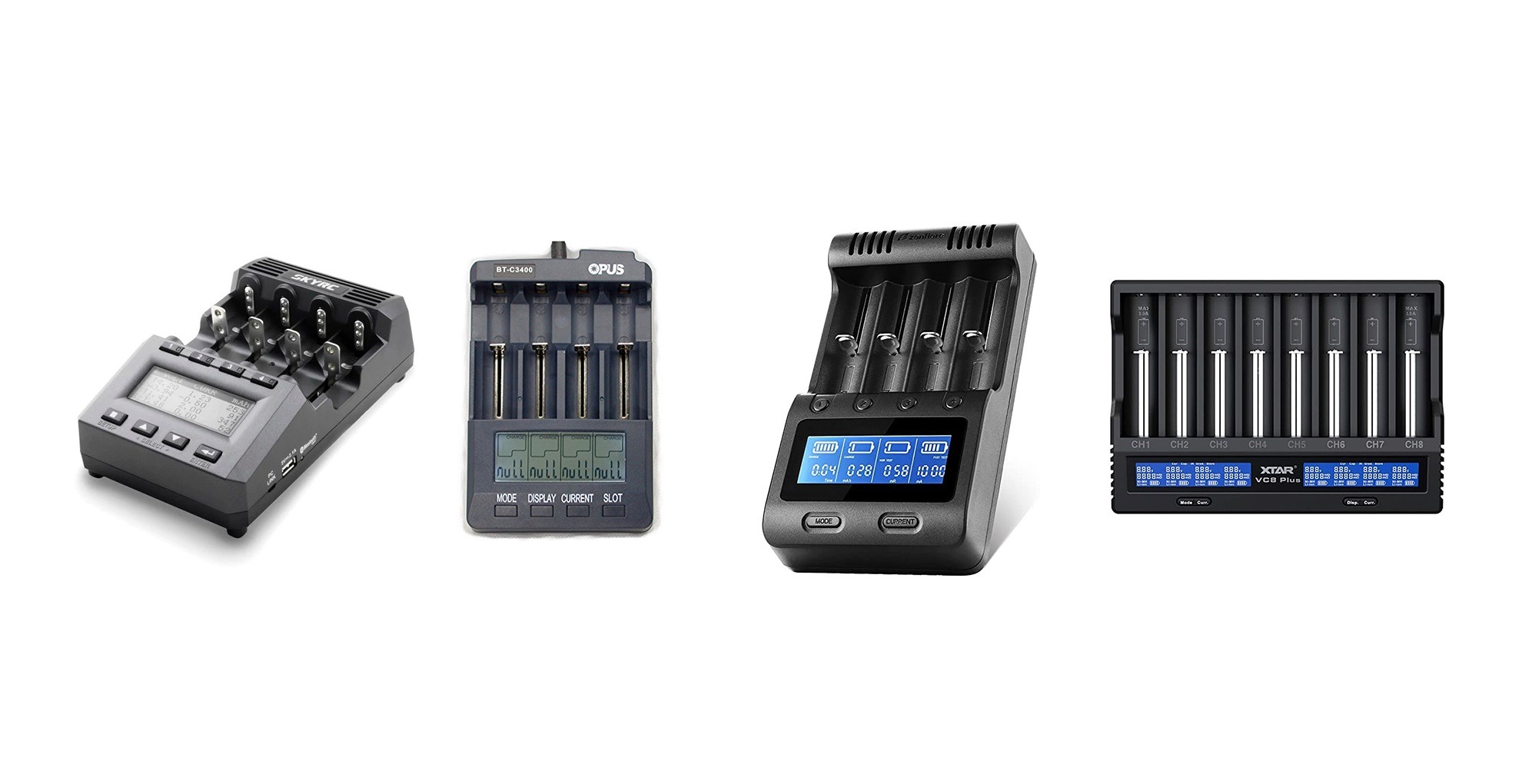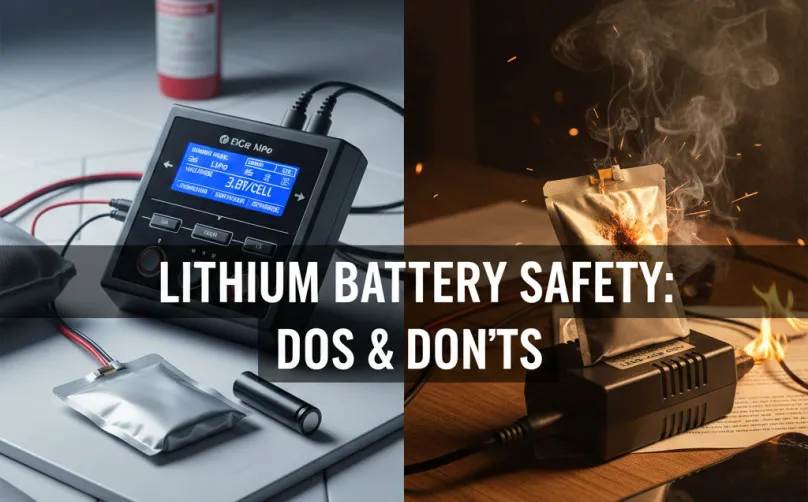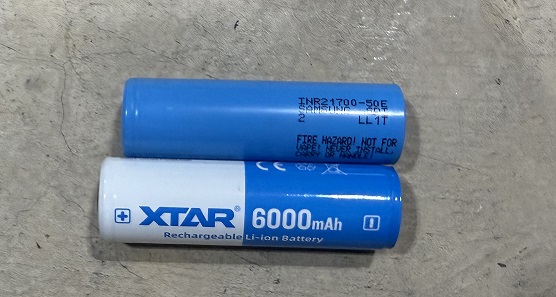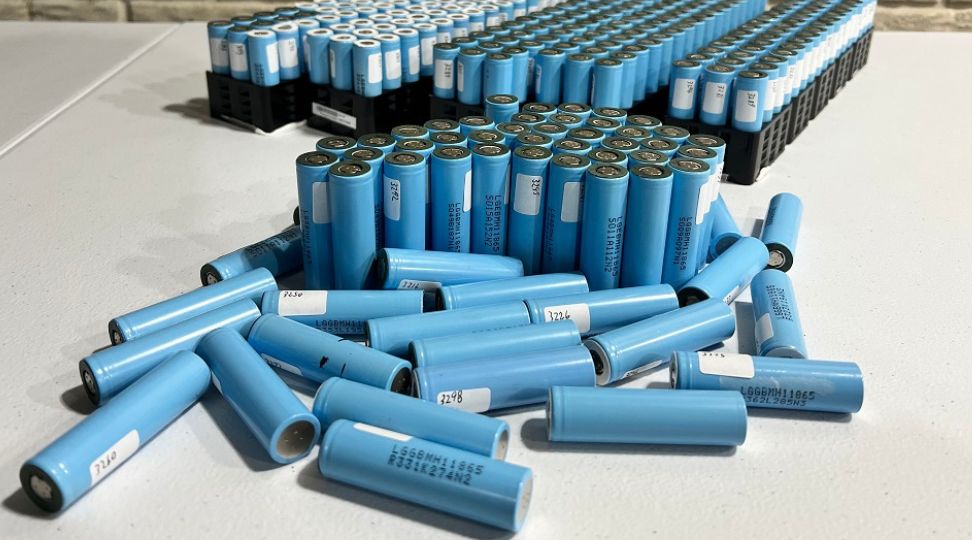
Best Cell Tester And Chargers 18650/21700
Table of Contents
If you are building battery packs and handling many lithium-ion cells, then you are probably looking for the best cell testers and chargers for 18650/21700 batteries. It’s obvious that anyone working with batteries is going to need a charger, but it may not be so obvious that you need a tester.
Without a cell tester, all you can do is trust the rating on the labels. If you are buying sub-standard cells, you won't know without testing this. This means that if a cell does not live up to its expectations, you could underestimate the size of the battery you need. If you are selling those battery packs, that could lead to complaints, returns, and other perils. Cell testers are also good for safety reasons. If you test a cell and can see that it has a problem, then you wouldn't put that cell in a battery pack where it could lead to a disaster.
For this reason and many others, it's important to know the quality of the cells that you are dealing with. Cell resistance, capacity, and how long it's able to hold a full charge voltage are all important factors to consider. For testing cell resistance otherwise known as IR, we recommend using a dedicated IR tester.
Based on our experience, the SkyRC MC3000 is super accurate, has fast charging speeds, and supports many different cell types, so it's the best cell tester and charger for 18650/21700 cells. The Opus C3400 is also a very good alternative. If you want something a little cheaper or simply don't need the higher-end features, the Zanflare or XTAR VC8 Plus are both good options.
In this article, we will go over a list of devices that are useful for anyone building a battery and they are ranked by our experiences with them. We also recommend checking out our article on how to test lithium cells to get a better understanding of why having a good 18650/21700 cell tester is important.
Best 18650 Charger Tester Overall Highest Price SkyRC MC3000
The SkyRC MC3000 is one of the most advanced hobby-grade chargers and capacity testers for cylindrical cells that you can get. This charger works with many different battery chemistries including but not limited to NiMH, NiCD, Lithium Ion, LiFePO4, and NiZn.
- When not powered on, the charger will discharge about 4mA from any cells that are connected.
- When powered on, the charger will discharge at around 0.4mA.
- A battery with a voltage of 0.10 volts or higher will register as a battery cell.
- Voltage accuracy is within 0.01 volts, which is very good.
- Charging current is equally as accurate, within 0.01A of most digital multimeters.
- Configurable trickle charging.
- Configurable charging voltage.
- Configurable DV/DT sensitivity.
- Unloaded power consumption is just 1.1 watts
The SkyRC charger supports a maximum of 3 amps of charge current for each of the 4 slots. This makes it the most powerful 18650/21700 cell charger available. The next closest can only do 3A and that is only in half of the available bays it has (see Opus and XTar below).
The SkyRC MC3000 supports multiple battery chemistries and has a Smartphone app that communicates via Bluetooth. This 18650 charger includes PC software that allows you to plot various battery data. It also provides full control over the charge rate, rest time, discharge rate, cut-off voltage, and more.
Some of the drawbacks are that it’s a bit expensive and can be somewhat complicated for novice battery users. This charger is also a little bulkier than others we've tested.
[[ aff type=aff ~ link=https://amzn.to/3inGgIw ~ title=`SkyRC MC3000 Cell Tester and Charger` ~ image=https://admin.cellsaviors.com/storage/41OlJ9B3J9L._AC_.jpg ~ description=`Charge cell up to 3A and discharge up to 2A` ~ height=small ~ buttonText=`Check Price` ]]
Best Tester Price Accuracy Balance Opus BT-C3400
This charger is also one that can analyze 18650 and 21700 battery cells. The Opus BT-C3400 can measure the battery current and voltage while the battery is charging or discharging. In my experience, this is the best price-to-accuracy balance.
The only accessory it comes with is a 12-volt 3-amp power supply.
This 21700/18650 charger has several different modes:
- CHARGE: This mode will charge a cell with 200 to 1000 mA (2000ma if only slots 1 and 4 are used).
- DISCHARGE: This mode will discharge a battery cell with 200 to 1000 mA.
- DISCHARGE REFRESH: This mode will discharge and charge the battery cell 3 times in a row.
- CHARGE TEST: In this mode, the cell is charged, then discharged, and then charged again.
- QUICK TEST: This mode measures the battery cell's internal resistance.
This charger is powerful, so it has a built-in fan to help keep it cool. This is so that each channel can be run at a higher power. Many other chargers may claim a certain current carrying capacity, but that is usually divided between all of the slots. This charger does charge faster when only slots 1 and 4 are used.
The Opus BT-C3400 has the traditional slider format, so it will work with most battery sizes. The sliders have enough room for a battery anywhere from 32 mm to 72.5 mm in length. The slider has a very high connection resistance, however, so it's not useful for getting super accurate internal resistance measurements.
If you are using only slots 1 and 4 OR just 1 or 4, the maximum charge current is 2000mA. When using any number of additional slots, however, the charge current maxes out at 1000mA. Regardless of the slot configuration, the maximum discharge current will always be 1000mA.
Here is the list of available charge and discharge currents:
Charge currents in mA: 200, 300, 500, 700, 1000, 1500, 2000
Discharge currents in mA: 200, 300, 500, 700, 1000
Things to consider and notable aspects:
- The LCD backlight will turn off after 20 seconds of inactivity
- Even when charging only 1 battery at just 0.5A, the fun will turn on and off frequently
- The fan will run continuously when charging 4 batteries at 1A
- Taking the cells out and putting them back in will restart the last selected mode.
- When cells are inserted and no buttons are pressed after a few seconds, a 0.5A charge will begin.
- This charger measures the voltage when the charging is disabled.
- The voltage display is updated once every 60 seconds.
[[ aff type=aff ~ link=https://amzn.to/3uaxf8i ~ title=`Opus BT-C3400` ~ image=https://admin.cellsaviors.com/storage/2-opus.jpg ~ description=`Charges cells at up to 2A and discharge up to 1A` ~ height=small ~ buttonText=`Check Price` ]]
Best Charger Tester Budget Price Zanflare C4 Battery Charger
The Zanflare C4 smart charger is a UL-listed universal battery charger that can simultaneously charge batteries of different specifications and chemistries. The battery voltage, charge current, charge time, capacity, and internal resistance can all be viewed by pressing the button for each property.
One of the coolest things about the Zanflare C4 battery charger is that it has a built-in USB port that allows you to use it as a power bank. If only one 18650 cell is installed, the USB port can output 1 amp, but if you install 2 or more 18650 batteries, the built-in USB port can support 2A.
This charger lets you set the charging speed to either 300mA, 500mA, 700mA, or 1000mA. Each slot works independently, so each bank can run its own mode. There are three charge modes.
The Zanflare C4 18650 battery charger supports three modes. Charge, Fast Test, and NOR Test.
Charge Mode
Charge mode is exactly what it sounds like, and the system simply charges the batteries @ up to 1A.
Fast Test Mode
Fast Test mode allows you to choose from several discharge currents that are used to fully discharge the cell before fully recharging it.
NOR Test Mode
NOR Test Mode is a bit more comprehensive. In this mode, the cell is first fully charged, then discharged, and then recharged again.
Features
This charger gives you 4 different charge currents to choose from. This can be helpful because a smaller battery cell may not be able to take a full 1 amp charge. When a battery cell is fully charged, 'END' will begin flashing for that cell.
- Overcharge and over-discharge protection
- Overtemperature protection
- Short circuit protection
- 0V voltage activation function
- Can identify damaged batteries
- Reverse polarity protection
- 4 independent slots
[[ aff type=aff ~ link=https://amzn.to/3ViQKHV ~ title=`Zanflare C4` ~ image=https://admin.cellsaviors.com/storage/3-zanflare.jpg ~ description=`Charges cells at up to 2A and discharge up to 500mA` ~ height=small ~ buttonText=`Check Price` ]]
Good Tester Option for Flexibility XTAR 8 Slots Battery Charger
The XTAR battery charger can charge up to eight different battery cells simultaneously. This charger can charge 18650 and 21700 lithium-ion cells in addition to rechargeable AA, AAA, and C batteries. One of the best things about this charger is that you don't even have to set the cell type. The charger will automatically determine the battery type and select the proper charging method.
Like many other high-quality chargers, this one uses a microcontroller to make sure the battery is not overcharged, over-currented, or short-circuited. This charger also provides a selectable amount of charge current. The XTAR battery charger has a ‘charge and discharge when charging’ mode that will determine the cell capacity.
- When not powered on, this charger will discharge around 2.2mA from the cells
- If a cell is below 2V, it is assumed to be NiMH, above that it's assumed to be li Ion
- Charging restarts if a cell falls below 3.9V.
- Voltage is accurate to within 0.02V
- Voltage stops updating after charging completes.
- Has a STOR function to get cells to nominal voltage for storage, this is my favorite thing about this charger.
- Slot 1 and 8 has a 3A current
- All other slots have 0.25A, 0.5A, 1A & 2A current settings.
- The backlight goes to low brightness after 60 seconds of idle time.
While it's true that this charger supports several battery chemistries, it really excels at being a lithium-ion cell charger.
[[ aff type=aff ~ link=https://amzn.to/3OQUeyJ ~ title=`XTAR VC8 Plus` ~ image=https://admin.cellsaviors.com/storage/4-xtar.jpg ~ description=`Can charge cells up to 3A, discharge 500mA, and also has a STOR function. ` ~ height=small ~ buttonText=`Check Price` ]]
Things To Consider Before Buying a Battery Tester Or Charger
Compatibility
If you are trying to charge a standard NMC lithium-ion cell, then make sure you don't get a charger that only works for NiCd batteries. Similarly, if you want to charge an LFP cell, make sure you don't get a charger that only works for NMC lithium-ion.
Many chargers on the market support multiple battery types and that is ok, just make sure that one of the types of batteries that the charger supports is the one that you are looking to use it with.
Charging Speed
Some chargers take a really long time to charge larger cells. So, make sure that the charger you are looking to buy supports the charging currents that you will need to charge your batteries as quickly as you would like to.
For example, if a charger can only charge a cell at 500ma, that means it will take over 10 hours to fully charge a 5Ah cell. So, if you are charging larger cells, you might want to find a charger that can support at least 1 amp of charging current.
Number of Slots
If you only need to charge or test a cell every once in a while then a single-slot or dual-slot charger or tester would work fine. But if you are someone who regularly works with batteries and will pretty much constantly be testing cells, a 4 or 8-slot device is a much more reasonable choice.
Conclusion
If you are new to battery building or are just not super familiar with all of the terminologies involved, it can be somewhat overwhelming to find the best cell testers and chargers for 18650 and 21700 cells.
Being able to charge and test your cells is crucial. If you have a cell tester, you will be able to verify that a battery cell is performing as it's supposed to. You will also be able to weed out bad cells before putting them into a build, which greatly reduces the chances that any of the batteries that you build will ever have any problems. For this reason, the lithium-ion cell chargers that have testing features built-in are the most reasonable option for most people.
We think the SkyRC MC3000 is the best cell tester and charger for 18650/21700 cells because it has a wide cell compatibility, fast charging speeds, and a high level of voltage accuracy. The Opus C3400 is also a very good alternative if you want to save a little money but still want something relatively high-end. If you are looking to save money or just don't need any of the higher-end features, then the Zanflare or XTAR VC8 Plus will do just fine.
We hope this article helped you find the best cell testers and chargers for 18650 and 21700 cells. Thanks for reading!


